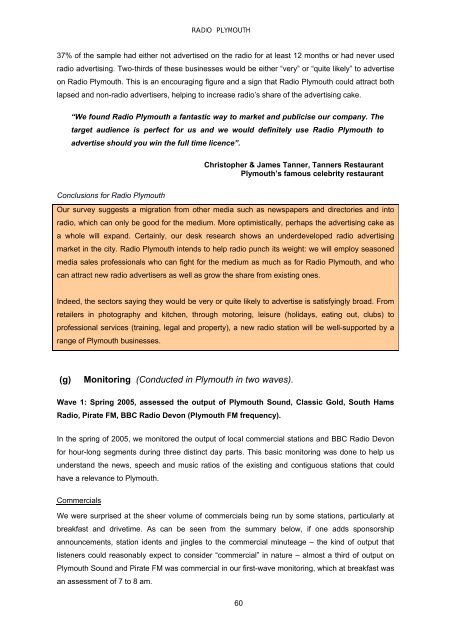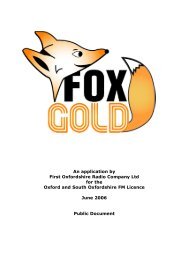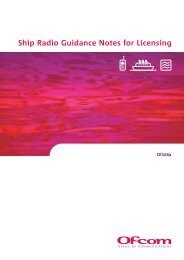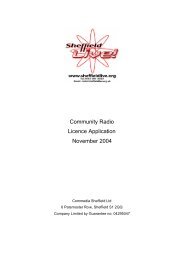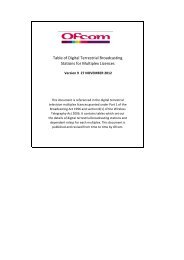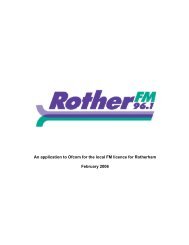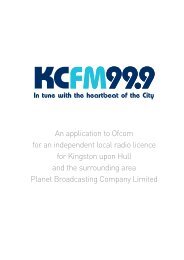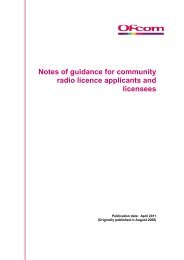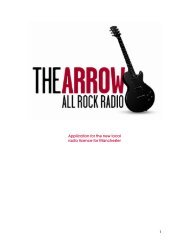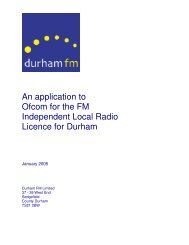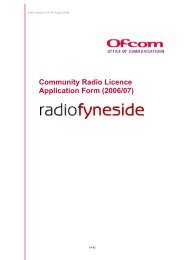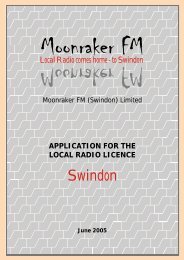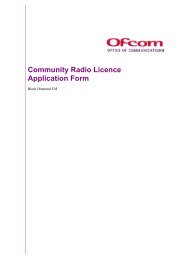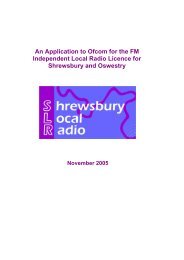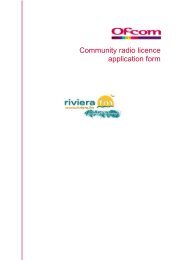Radio Plymouth - Ofcom Licensing
Radio Plymouth - Ofcom Licensing
Radio Plymouth - Ofcom Licensing
Create successful ePaper yourself
Turn your PDF publications into a flip-book with our unique Google optimized e-Paper software.
RADIO PLYMOUTH<br />
37% of the sample had either not advertised on the radio for at least 12 months or had never used<br />
radio advertising. Two-thirds of these businesses would be either “very” or “quite likely” to advertise<br />
on <strong>Radio</strong> <strong>Plymouth</strong>. This is an encouraging figure and a sign that <strong>Radio</strong> <strong>Plymouth</strong> could attract both<br />
lapsed and non-radio advertisers, helping to increase radio’s share of the advertising cake.<br />
“We found <strong>Radio</strong> <strong>Plymouth</strong> a fantastic way to market and publicise our company. The<br />
target audience is perfect for us and we would definitely use <strong>Radio</strong> <strong>Plymouth</strong> to<br />
advertise should you win the full time licence”.<br />
Conclusions for <strong>Radio</strong> <strong>Plymouth</strong><br />
Christopher & James Tanner, Tanners Restaurant<br />
<strong>Plymouth</strong>’s famous celebrity restaurant<br />
Our survey suggests a migration from other media such as newspapers and directories and into<br />
radio, which can only be good for the medium. More optimistically, perhaps the advertising cake as<br />
a whole will expand. Certainly, our desk research shows an underdeveloped radio advertising<br />
market in the city. <strong>Radio</strong> <strong>Plymouth</strong> intends to help radio punch its weight: we will employ seasoned<br />
media sales professionals who can fight for the medium as much as for <strong>Radio</strong> <strong>Plymouth</strong>, and who<br />
can attract new radio advertisers as well as grow the share from existing ones.<br />
Indeed, the sectors saying they would be very or quite likely to advertise is satisfyingly broad. From<br />
retailers in photography and kitchen, through motoring, leisure (holidays, eating out, clubs) to<br />
professional services (training, legal and property), a new radio station will be well-supported by a<br />
range of <strong>Plymouth</strong> businesses.<br />
(g) Monitoring (Conducted in <strong>Plymouth</strong> in two waves).<br />
Wave 1: Spring 2005, assessed the output of <strong>Plymouth</strong> Sound, Classic Gold, South Hams<br />
<strong>Radio</strong>, Pirate FM, BBC <strong>Radio</strong> Devon (<strong>Plymouth</strong> FM frequency).<br />
In the spring of 2005, we monitored the output of local commercial stations and BBC <strong>Radio</strong> Devon<br />
for hour-long segments during three distinct day parts. This basic monitoring was done to help us<br />
understand the news, speech and music ratios of the existing and contiguous stations that could<br />
have a relevance to <strong>Plymouth</strong>.<br />
Commercials<br />
We were surprised at the sheer volume of commercials being run by some stations, particularly at<br />
breakfast and drivetime. As can be seen from the summary below, if one adds sponsorship<br />
announcements, station idents and jingles to the commercial minuteage – the kind of output that<br />
listeners could reasonably expect to consider “commercial” in nature – almost a third of output on<br />
<strong>Plymouth</strong> Sound and Pirate FM was commercial in our first-wave monitoring, which at breakfast was<br />
an assessment of 7 to 8 am.<br />
60


